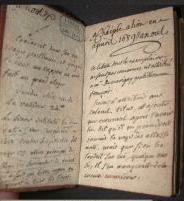|
Silius Titus
Silius Titus (1623 – 16 December 1704), of Bushey, was an English politician,Captain of Deal Castle, and Groom of the Bedchamber to King Charles II. Titus was an organizer in the attempted escape of King Charles I from Carisbrooke Castle.[1] Early lifeHe was born in London, the son of Silas Titus, a salter and Constatia (Constance) Colley. He was educated at Christ Church, Oxford, where he matriculated in 1638, and the Middle Temple. Killing No Murder Titus began his political aspirations by writing a pamphlet titled Killing No Murder in 1657 during The Protectorate period of the English Interregnum era of English history. The pamphlet advocated the assassination of Oliver Cromwell. Due to the danger involved in writing such a politically charged opinion against the Protector, Killing No Murder was published under the pseudonym 'William Allen'. Cromwell was said to have been so disturbed after the publication of Killing No Murder that he never spent more than two nights in the same place and always took extreme precaution in planning his travel. Titus's authorship of this pamphlet has been disputed in some circles; it has also been attributed to Edward Sexby,[2] or a man by the real name of William Allen. These attributions are usually unfounded as King Charles II awarded Titus the title of Groom of the Bedchamber for his service in authoring the work. Political lifeSilius Titus first took up arms for the Parliament. Although he was a strong Presbyterian Titus became an ardent Royalist devoted to Charles I and King Charles II.[3] He became a member of parliament, successively representing Ludgershall (1660), Lostwithiel (1670–1678), Hertfordshire (1678–1679), Huntingdonshire (1679–1685) and Ludlow (1691–1695).[citation needed] Though not eloquent, he would often illustrate his speeches with a humor that rendered them effective. For instance, when it was complained that Titus made sport of the House of Commons of England, he retorted that "things were not necessarily serious because they were dull". Once again, when Charles II offered to impose limitations on a Roman Catholic Church sovereign rather than exclude his brother from the throne, Titus likened such a plan to "having a lion in the lobby and then voting to secure ourselves by letting him in and chaining him, rather than by keeping him out".[citation needed] Titus also served King James II but later transferred his allegiance to William III. During his life he held a number of royal appointments: Keeper of Deal Castle (1661–1669), Colonel of the Cinque Ports Militia (1661–1669), Commissioner for Assessment for Middlesex (1661–1663), for Kent (1664–1669), for Leicestershire (1673–1679), for Hertfordshire (1673–1680), and for Huntingdonshire (1677–1680), assistant, Royal Adventurers into Africa (1663), assistant, Royal Fishing Company (1664), captain of a company in the Admiral's Regiment (1666), Privy Councillor (1688), Commissioner for Trade and Plantations (1688–1674), Conservator of the Bedford Level (1679-death), deputy-lieutenant of Hertfordshire (1680–1681, 1687–1689, 1701-death) and Commissioner for Inquiry into Recusancy Fines (1687).[citation needed] He was elected a Fellow of the Royal Society in January 1669.[4] When he died in 1704, Titus was buried at Bushey.[5] He had married c. 1645 Katherine, daughter of James Winstanley, Counsellor-at-law, of Gray's Inn and Braunstone, Leicestershire.[citation needed] Mentioned in Samuel Pepys' DiaryCaptain Titus was mentioned in the diary kept by Samuel Pepys on two occasions. The following excerpts come from the entries of those days.
References
External linksInformation related to Silius Titus |
||||||||||||||||||||